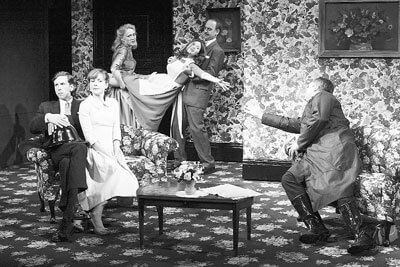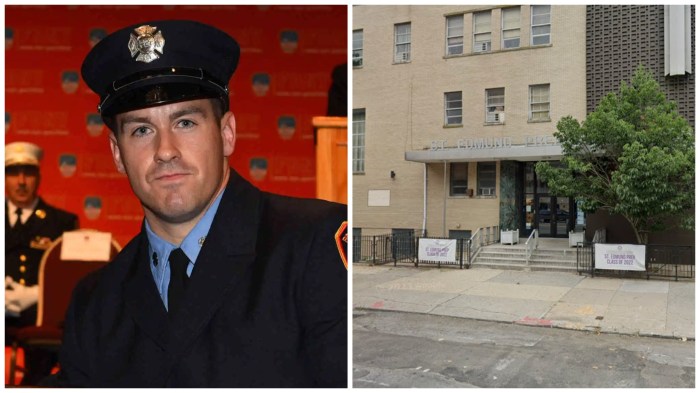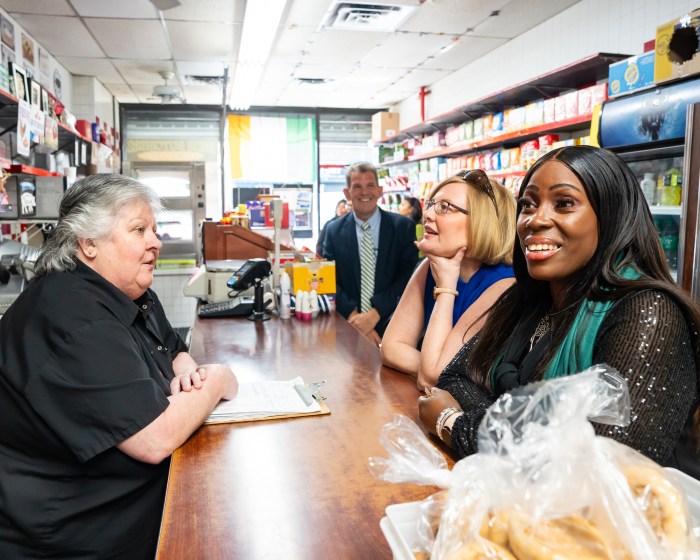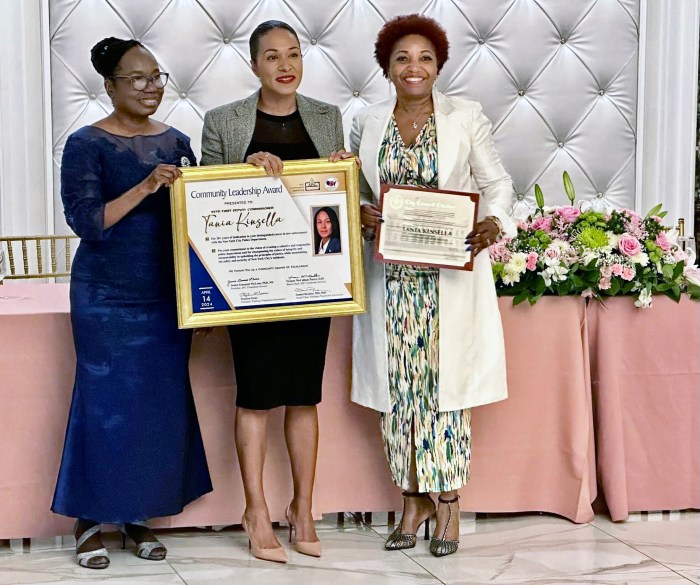Tina Howe adapts two classics from Eugene Ionesco and insists on their realism
Mr. and Mrs. Smith are at home. Mr. Smith has his nose buried in the newspaper. Without looking up, he mutters, “Good grief, it says Bobby Watson died.”
Mrs. Smith: My God, the poor chap. When did he die?
Mr. Smith: Why do you sound so surprised? You know perfectly well he’s been dead for two years. You remember, we went to his funeral together, a year and a half ago.
Mrs. Smith: Of course I remember. How could I forget? I just don’t understand your surprise at reading it in the paper.
Mr. Smith: It wasn’t in the paper. It’s been three years since we’ve mentioned his name. Can’t a fellow associate?
Mrs. Smith: What a shame! He was so well preserved.
Mr. Smith: The most smashing corpse in Great Britain. He didn’t look his age. Poor Bobby, it’s been four years since he died and he’s still warm. A truly unruly cadaver. What a gay blade.
Mrs. Smith: Poor Bobby.
Mr. Smith: Which poor Bobby do you mean?
It’s likely that of all the words in the above, the single clearest touch of Tina Howe—among an uncounted bundle of gifts from her to Eugene Ionesco—is that “truly unruly.” Sounds like her. But also like Ionesco. That’s the trick. Or to put it more highfalutin’-like, the art of the translator.
Having committed to learning English from a language primer at age 40, sitting there in Paris, copying out its idiotic sentences line by line, this is how it seemed to the Romanian-born Ionesco that English-speaking people spoke and thought. Out of that effort, in 1950—out of that cultural/psychological/linguistic jolt—came his first play, “The Bald Soprano” and with it the birth, or to be more precise, the post-World War II, post-Dada rebirth, of Theater of the Absurd.
But to Tina Howe, fresh out of Sarah Lawrence College, in Paris 10 years later, the conversations of Mr. and Mr. Smith, and their visitors Mr. and Mrs. Martin, and an intruding windbag Fire Chief, came as a different sort of jolt. It was just like being at home.
“My father,” said the translator of the Ionesco double-bill of “The Bald Soprano” and “The Lesson” at the Atlantic Theater under the direction of Carl Forsman—“my father gave me the following choice when I graduated from college—either go to graduate school for a year, or go to Europe for a year.
“So [fellow Sarah Lawrence graduate] Jane Alexander and I hopped a student steamship, she to go to the University of Edinburgh and study math, I to go to the Sorbonne to study philosophy. And within two weeks, we had both dropped out—she to act in the Edinburgh Fringe, and I to try to write.
“Back at college, Jane had directed my first full-length play, ‘Closing Time,’ an appalling mess about the end of the world. The leading lady got sick at the eleventh hour and Jane stepped in—and if you have Jane in anything it’s got to be marvelous.
“Now, in Paris, I myself was actually in a play, an absurdist play, ‘The Tomb of Henry James,’ written by the American poet Piero Heliczer, who had once dived off an ocean liner to swim to the Rock of Gibraltar.”
One of Howe’s fellows in the company, “a lovely English actor,” invited her to go see two plays by Ionesco, ‘La Cantatrice Chauve’ and ‘La Leçon,’ in some tiny space called Théatre de la Huchette.
“I had no idea who Ionesco was,” she wrote in a program note. “But the minute the curtain rose on ‘The Bald Soprano’ I was struck with such rapture I thought I’d expire. What scholars label ‘absurd’ was totally familiar to me! I knew the characters on stage! I’d grown up with them. I spoke their language! I shared their language and fears. It was the most astonishing flash of déjà vu I’d ever experienced.”
Tina Howe had in fact grown up on the Upper East Side of Manhattan, conveniently three blocks from the Metropolitan Museum of Art. Her father was foreign correspondent, author, news commentator Quincy Howe. Uncle Mark Howe was an eminent professor of constitutional law at Harvard. Aunt Helen Howe was a monologist at the Blue Angel.
“And then,” playwright Howe said—we’re now back in her and her husband’s West End Avenue apartment—“then Uncle Mark married Molly Manning, an Irish Quaker who was a good friend of [Samuel] Beckett’s and, among other things, did a dramatization of ‘Finnegan’s Wake,’ imagine how smart you have to be to do that.
“So I came from a very New England, very WASP, very literary family, where the spoken word was of great importance and language a sort of deity. Every night at six, my mother would turn on the radio news with a sigh of ‘poor Daddy,’ while I would play on the floor with my crayons.
“But also, in contrast, on weekends, there was the religious rite of going downtown to see Marx Brothers movies, and on Saturday afternoons to the Palace to see the vaudeville. Yet also this: When I got hepatitis on my return and was in Roosevelt Hospital, every night my father would come and read to me from James Joyce’s ‘Ulysses.’
“So,” Howe said with some intensity, “when the curtain rose at La Huchette, and all those people were trying to get through the evening in the polite, upstanding, proper way, it was just like being back home. When people call it absurd, I don’t know what they’re talking about, and I never understand when people say to me that Arthur Miller is realistic, because to me Ionesco is realistic.”
The people getting through the polite, upstanding, proper—don’t you believe it!—evening at the Atlantic are, in “The Bald Soprano,” actors Jan Maxwell, Michael Countryman, Maggie Lacey, Robert Stanton, Seana Kofoed and John Ellison Conlee.
In “The Lesson,” a far more ferocious work of pedantry and terror, first brought to this country by Julie Bovasso at her daring little Tempo Playhouse on St. Mark’s Place in the mid-1950s, the actors are Christa Scott-Reed, Steven Skybell and Maggie Kiley.
Tina Howe, whose “Painting Churches,” “Coastal Disturbances,” “Museum” and other dramas have won all sorts of awards of their own, says she never thought she’d end up translating Ionesco; that it came about through “an extraordinary confluence of circumstances.”
At Hunter College, where she has taught playwriting since 1990, “the acting department decided to put on a student production of ‘The Bald Soprano’ and I decided to be in it, because I always wanted to breathe the same air as the Smiths and the Martins.
“I did five performances as Mary, the maid, and I was truly terrible, but I was also struck by how clumsy the translation was.” When the Atlantic Theater tuned in to “the feeling in New York that it was time to take a new look at Ionesco,” there was also the feeling that new translations were needed, “and my friends knew how besotted I was with Ionesco, so my name came up.”
If, in translating Ionesco, she said, “you are a slave to the literal, then you lose all the punning and the alliteration and the rhythm. Amateur groups tend to add whipped cream to the cream, and that’s just death.”
A number of years ago she took her class to a two-part production of Ionesco—first in English, then in French—by Off-Broadway’s late, lamented Ubu Rep. “They vastly preferred the French.”
“When I came to passages [in French] of pure word play and nonsense, I tended to throw it out and come up with English nonsense of the same tone, same imagery, same rhythm,” Howe explained about her approach to the original Ionesco text. “But I sometimes decided it was too much like me, not him, so I rewrote it.”
In 1986 Tina Howe met and introduced Ionesco when he did a reading at the 92nd Street Y.
“I was expecting a roly-poly jolly man. He wasn’t. He was in pain. I was struck by how sad he was. The world sat heavily on his shoulders. He is not a clown. He is profound,” said this other playwright who calls herself an Ionesco acolyte, “walking around the streets of New York with a sandwich board” extolling his name and work.
Eugene Ionesco died in Paris in 1994. Like Bobby Watson, he’s still warm.


































